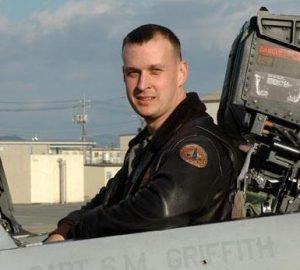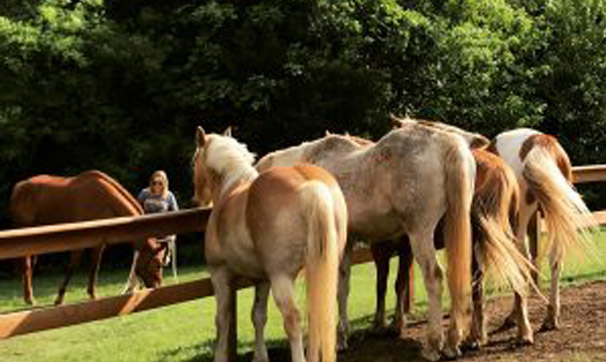Manes and Reins: A Gold Star Sister’s Journey to Healing
Manes and Reins: A Gold Star Sister’s Journey to Healing
By guest contributor Renee Nickell
I had heard the term PTSD as it related to war heroes, but I did not know much about its impacts on civilians. Post-Traumatic Stress Disorder is a mental affliction that can cause one to be hyper-vigilant, aggressive, easily angered, subjected to nightmares, depression, anxiety and more. After my brother, Major Samuel Griffith, was suddenly and tragically killed in Afghanistan, I did not even realize I, personally, had PTSD.
After several years of traditional therapy without much improvement, I decided to pursue equine therapy. With the assistance of trained therapists who help military and combat veterans and their families heal from the effects of PTSD, I was able to face my own level of PTSD after years of struggling.
Horses are capable of mirroring human emotion, allowing the patient to become more self-aware when feelings cannot easily be put into words. While I was skeptical in the beginning of therapy, the connection with the horse quickly brought comfort I hadn’t found anywhere else. I must admit: I was absolutely terrified at the start of my journey. I did not know what to expect from the horses or the sessions, and for me, that was scary. Over time, the bond that is formed with your gentle giant increases your confidence and ability to face painful circumstances in far less time than traditional therapy.
Equine therapy is now being used to treat various forms of illness, disabilities and medical conditions to include diabetes, autism, blindness, epilepsy, addictions and more. Horses do not have the ability to lie, therefore, the patient cannot manipulate the horse beyond its true feelings. This is extremely beneficial when building trust between the patient and the horse.
Gold Star siblings, in general, tend to place our grief on the back burner so that we may help support the surviving spouse or our parents through the grieving process. While each member of the family deals with their own grief separately, a sibling often postpones their grief, sometimes for years. This delay is to the detriment of the sibling and the family unit around them. PTSD can last for years, even decades. I have spoken to siblings whose brothers were killed in Vietnam and there is still a level of PTSD.
Not only did I suffer from PTSD, but my teenage daughter did as well. The day my brother was killed, she stepped into my role. The trauma was debilitating for me and it was my daughter that helped take care of everything that day, including protecting her younger siblings from the impact of the news. The weeks after, from retrieving his body at Dover to the funeral and then trying to resume somewhat of a normal life, was incredibly traumatic for all of us.
Our family is fortunate that we were able to find the necessary help to move us forward in our grief journey. Not only myself, but my veteran husband and my daughter benefited from equine therapy. We were able to heal as a family and face issues from the past that otherwise weren’t being addressed. We are not talking about playing with horses here! Equine therapy is a lot of hard work and deep soul searching. It can be quite painful to face the things we long to forget, even childhood traumas. This is why it is so important to find a reputable equine therapist who is skilled in treating PTSD and other mental health disorders.
There are many organizations that are non-profit and will assist a veteran and family for free or low-cost. Many even take Tricare insurance. If you or a loved one struggle with PTSD and feel you can benefit from equine therapy, I would recommend searching your area for licensed equine therapists. We are now in a 17-year war with countless veterans suffering from PTSD, and there are many organizations that are ready and willing to help them recover to live as best a normal and peaceful life as possible.

(Major Samuel Griffith, USMC, was an F/A-18 aviator and Forward Air Controller.
He was killed December 14, 2011, in the Helmand Province, Afghanistan in support of OEF.)

Renee Nickell is the author of “Always My Hero: The Road to Hope & Healing Following
Her Brother’s Death in Afghanistan.” For more about Renee, go to www.reneenickell.com.



















